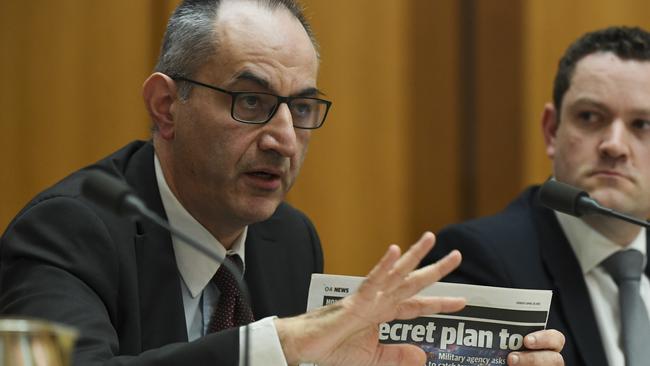Journalist’s document leaker ‘should go to jail’, says Pezzullo
The AFP has a suspect they believe leaked a top secret document, to a journalist whose home was raided.

Home Affairs secretary Mike Pezzullo has declared the person who leaked a top secret document to a News Corp journalist should “go to jail”, as federal police reveal they have identified a suspect and are concerned about their position in the public service.
The powerful Parliamentary Joint Committee on Intelligence and Security also heard warnings from the Australian Federal Police and ASIO that Australia’s international reputation was at risk and global partners would not share important information if they did not believe it would be protected.
The comments come after News Corp Australasia executive chairman Michael Miller called for a raft of changes to legislation to protect journalists, warning Australians are at risk of losing their democratic freedoms.
“We may not be living in a police state, but we are living in an ever-increasing state of secrecy,’’ Mr Miller said.
Federal parliament is considering how law enforcement and intelligence powers are impacting the freedom of the press after the AFP raided the home of News’ Sunday politics editor Annika Smethurst in June over a 2018 story she wrote suggesting the country’s cyber spy agency could for the first time monitor Australians.
The next day the agency raided the ABC over its series called The Afghan Files.
Mr Pezzullo unleashed a scathing attack against the leaker for handing over sensitive information to News Corp, publisher of The Australian, saying he knew the document “intimately”.
He was also critical of The Sunday Telegraph for publishing a screenshot of the top secret document.
“Frankly, subject to judicial process and fair process, they (the leaker) should go to jail for that,” Mr Pezzullo said.
“It was designed to play into a Canberra game about which agency is asking other agencies to expand its powers and remits. It’s completely unacceptable for public servants to be playing in that way.
“It is completely unacceptable for someone to have given the journalist that document or at least passed on a screenshot or passed on some imagery of it. It is a crime.”
AFP deputy commissioner Neil Gaughan revealed there was “significant concern” about where the person who leaked to Smethurst “potentially sits within the bureaucracy”.
“That’s a live investigation … We still have some work to do in relation to the person who we suspect has provided the information to Ms Smethurst,” he said.
Mr Gaughan cautioned the “information flow” from overseas agencies and organisations could “cut off” if there were leaks.
“If it is shown that we can’t protect information, the ability or the willingness of those agencies and organisations to provide information to Australia that may actually prevent a national security issue is extremely high,” he said.
Mr Gaughan also said top secret information could be “compromised” if it was held by media organisations.
“Top secret information that exists within the Australian infrastructure, as most of you would be aware, is extremely well protected and very difficult for people to have access to, particularly foreign actors,” he said.
“If we have (top secret) information sitting on an unclassified network within, say, a journalists’ organisation, the ability for that to be compromised, I think, is quite high and it is quite worrying.”
Outgoing AFP commissioner Mr Colvin said the agency had received 75 referrals in the last five years for potential unauthorised disclosure offences that “could have resulted in evidence being sought from a journalist”.
That had only occurred on two occasions — the investigations into leaks that formed the basis of stories written by Smethurst and the ABC’s Dan Oakes and Sam Clark.
“As police we do not target specific sectors of the community, such as the media, we target criminality, which is determined by the laws created by the parliament and based on our investigation we establish facts and evidence,” Mr Colvin told the committee.
“Of course we make decisions about prioritising our investigations but we do not pick and choose which offences we investigate based on random grounds. We use legal and operational frameworks to make these judgments and determinations.
“The very real and proper concept of press freedom has to be balanced against a range of factors, including national security and operational safety … If there is an imbalance between national security and press freedoms then that imbalance needs to be addressed through law to ensure there is no ambiguity.
“Being on the receiving end of police information gathering powers does not necessarily make someone a suspect and it does not mean that the CDPP (Commonwealth Director of Public Prosecutions) will be prosecuting.”
Asked by Labor’s legal affairs spokesman Mark Dreyfus if Smethurst could be charged, Mr Colvin responded: “It remains the case that the investigation is ongoing.”
Media executives last month received no assurances from the Morrison government that the journalists targeted in raids would not be prosecuted and voiced concerns the PJCIS was the wrong forum to investigate press freedom.
ABC managing director David Anderson said yesterday that there was an “urgent need to restore the balance between secrecy and accountability in the nation’s affairs”.




To join the conversation, please log in. Don't have an account? Register
Join the conversation, you are commenting as Logout